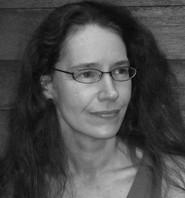2012 Contest: An Interview with Fiction Judge Mary Caponegro

Interview by DARA EWING
What I love about Mary Caponegro is her delight in scenes or moments that might pass unnoticed had she not slowed them down, zoomed in, and provided them with the attention they never knew they deserved. She admits that fabulist writing is the thing she best loves, but has come around to the glories of the real.
The interview below is not meant to be a key to unlock the secrets of her preferences, but might be used rather as a keyhole, a tiny spot through which you might get a wee glimpse of her thoughtfulness, her care in writing, and, importantly, her sense of humor.
Black Warrior Review: If you were to, say, judge a fiction contest for BWR, what kind of writing might you get excited about? How have your aesthetic interests changed over the years?
Mary Caponegro: I am excited by many different qualities in fiction: originality (a word I suppose should be put in inverted commas), beauty, intelligence, elegance, precision, craftsmanship, lyricism, ruthlessness, formal innovation, compassion. My aesthetic interests have not changed exactly, but I think they have broadened considerably. I appreciate a much wider range of fiction than I did when I was starting out as writer. I was very much the avant garde snob, and I couldn’t invest as deeply in realistic fiction. That has altered, and I read, love and teach a very wide spectrum, from realist to experimental.
BWR: What’s your favorite beet root vegetable?
MC: Do carrots count? I have to pass on the beet, forgive me. Probably the potato wins, if I’m being honest.
BWR: Your fiction implies you have a good sense of humor. What’s the best response to give to someone who tells you you have none?
MC: Read my fiction! (But of course, my humor is not what everyone considers the most accessible—or desirable–humor!)
BWR: What do you say to a person who is afraid to submit their work, because it isn’t perfect yet?
MC: I would say that to strive for perfection is commendable, especially in an era in which so many are eager to publish. I think it is healthy to enter the world with the most polished work that you can offer. On the other hand, waiting forever to achieve an impossible standard is neither healthy nor practical.
BWR: Have you written the piece you meant to write? What do you think of your old stuff?
MC: Every piece I finish is not quite the piece I hoped for, and yet the absolute best I could do in realizing the conception I had of it. I work an inordinately long time on each piece of fiction I produce, and even though only when something is published does one realize certain flaws, the other flaws are perhaps necessary flaws, given one’s abilities and limitations. Ironically enough, I have spent many years on a novel that I NEVER meant to write, and as it draws toward closure, I try to figure out what that is meant to teach me. My “old stuff” is hard for me to separate from more recent work, because I think of each piece as its own entity, as well as a part of some organic evolving vision. I do find it amusing that what probably remains my most “popular” work is my earliest story, “The Star Café.” I have tried to make myself grow, not repeat myself over and over, and thus have headed in a somewhat more mimetic direction that I ever anticipated. But the fabular is where my roots are. (So perhaps fabulism is my favorite root vegetable!)
BWR: What’s the best font?
MC: I could tell you by eye but not by name, and admire those who could do the latter.
BWR: What’s the optimal writing space?
MC: Any quiet space kept at a reasonable temperature with some ergonomic features for sitting and typing will do fine, but “a room with a view” is still my ideal place, corny as that may be. I have always had all kinds of idyllic notions of what my own studio space should look like, and yet I am not very adept at bringing any of that to fruition. I tend to find myself in a messy room, with books and papers stacked around me, and not enough surface area where I’m writing. Pretty pathetic! But I always have some green to look at: a tree or a wooded area, and I always lust for a water view. Pretty bourgeois. My fondest memory of an ideal writing environment remains my splendid studio at the American Academy in Rome, when I was a fellow there twenty years ago. The Casa Rustica was intended for a composer; it looked out on the garden through French doors, and it had a Steinway inside. Fortuitously, the composer in residence that year preferred to compose in umbral spaces, so the small, dark cave-like space I had been assigned was traded to him, and got the garden view and the Steinway to book! I think I’ve been yearning to duplicate that situation for the last two decades. Another studio I once had there was meant for a painter, and that allowed me to tack up all my pages on the wall, so I could survey them en masse, and that was enormously beneficial for me.